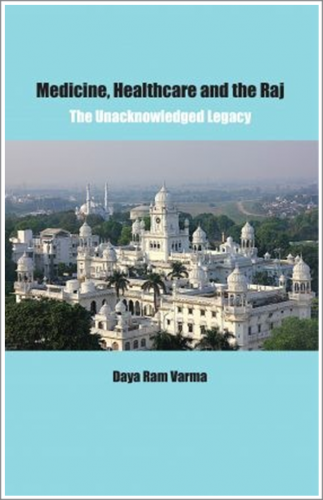Medicine, Healthcare and the Raj. The Unacknowledged Legacy. By Daya Ram Varma. Three Essays Collective, 2015, Gurgaon, India.
Dr. Daya Ram Varma (1929-2015) graduated with honours from the prestigious King George Medical University in Lucknow, India. He obtained his PhD from McGill University in Montreal from where he retired as Professor Emeritus.
Medicine, Healthcare and the Raj is a dispassionate account of the state of medicine and public health in India before, during and after independence from the British Raj. It is also a straightforward analysis of the relative merits and limitations of Ayurveda, Unani-Tibb (Islamic) and Chinese medicineI vis-a-vis a vastly “superior” modern medicine which Varma resolutely refuses to label as “Western”. His contention is that modern medicine as we know it today did not actually originate in Greece but in Egypt. Moreover, for him there is no such thing as several schools of medicine, but only one, that is, evidence-based medicine, which might incorporate elements of other medical traditions if proven to have scientific merit.
Varma also acknowledges that medicine, as a discipline, has no national boundaries. What makes the state of public health and medicine differ from one country to another is the political will to remove social and economic inequalities through public funding of medical schools and hospitals and the accessibility of universal medical care. To prove this point, he compares the United States with Cuba: the average US citizen has little access to quality medical care whereas the average Cuban has universal access at a low cost.
As a committed socialist, Dr. Varma understood that poverty is in itself a disease and engenders other diseases. He also recognizes that while most diseases are episodic, poverty is a life-long disease. Another factor favouring disease is inequality. He also reminds readers that “although industrialization creates the necessity of healthcare for its own survival, it also promotes diseases as a by-product”. This idea is an echo of Karl Marx’s uncompromising critique of British capitalism and colonialism which brought public health and trained physicians to India (for its own commercial purposes) whilst also exacerbating inequalities in the country. In this context, Dr. Varma reminds us that the British lived in distinct cantonment and civil lines areas which took into account soil, water, elevation and social and physical segregation from the vulnerable local populations forced to live in unsanitary urbanized conditions in order to provide cheap labour for the Empire.
Dr. Varma, who was born in an impoverished village in North India, generously acknowledges the major contributions of colonial physicians in India in the fields of malaria, kala-azar and iodine-deficient goitre. He is also quick to deplore the fact that while the British were able to abolish sati or the custom of burning widows at their husband’s funeral pyre, the Indian government has been unable to put an end to female foeticide in modern-day India. Neither does he hesitate to admit that medical ethics were more solid in British India than in post-independence India afflicted by corruption and administrative ineptitude. However, he wryly remarks that medical tourism in India is booming because of the availability of highly skilled physicians and state-of-the-art hospitals for those with money. On the other hand, he decries the lack of recognition of some Indian scientists in major scientific breakthroughs whereas their Western counterparts have been rewarded with Nobel Prizes.
Daya Varma’s conclusions are as realistic/optimistic as his humanitarian outlook:
“Pre-colonial India was fragmented into multiple enclaves ruled by despotic feudalists. British made India into one country. Since they left, regional political forces have been steadily emerging, threatening the unity of India…. Indian secularism is threatened. Indian democracy is in practice barely more than periodic elections. But whatever happens to India, science has its own power, and modern medicine, introduced by the Raj, will not only survive but become more universal”.









